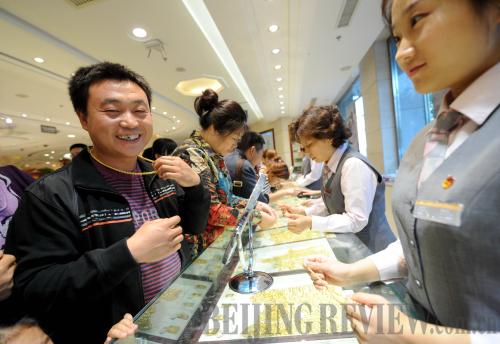|
 |
|
GOLD RUSH: A customer looks at a gold necklace at the Beijing Caibai Ornaments Store. During this year's Spring Festival, sales of gold and jewelry boomed across the nation (LUO XIAOGUANG) |
Liu Yuxuan, a Japanese translator in Beijing, is one of those thrift-minded Chinese who tend to live within their means. Like many others, 30-year-old Liu places the bulk of her salary in a savings account and tries to cut back on unnecessary expenditures. Nevertheless, she spent 8,000 yuan ($1,215)—around two months' salary—for this year's Spring Festival, which fell on February 3. "I bought a laptop as a special treat for myself and three pieces of clothing as gifts for my parents," she said. "After all, it is the most important holiday of the year."
Despite its reputation as a nation of savers, China experienced a surge in retail sales as consumers opened their wallets to celebrate the Spring Festival. During this year's seven-day holiday (February 2-8), retail stores and restaurants across the nation recorded sales revenue of 404.5 billion yuan ($61.5 billion), up 19 percent from the previous year, said the Ministry of Commerce (MOFCOM).
Revenues of catering businesses in Shandong, Shaanxi and Heilongjiang provinces jumped more than 20 percent over the previous year, while the hotel industry in Sichuan Province witnessed a 30-40 percent surge in sales during the week, said MOFCOM.
With the employment landscape warming up and wages increasing, Chinese consumers have more money than a year ago when the economy was struggling to regain lost ground. This year, stores across the country were packed with holiday shoppers. With big promotions and better services, cash registers rang up handsome sales.
"The consuming boom is remarkable especially in light of a high inflation rate in 2010," said Lu Zhengwei, an analyst at the Industrial Bank Ltd. "It underscores the initial success of China's effort to readjust the economy to rely more on domestic demand."
The greater purchasing power comes mainly from individuals' expanding wealth, especially that of the large rural population, he said.
For the first time in 13 years, income growth for farmers outpaced that of urban residents in 2010. The per-capita net income for farmers was 5,919 yuan ($900), up 14.9 percent year on year while per-capita disposable income for urban residents climbed 11.3 percent to reach 19,109 yuan ($2,904).
Morgan Stanley even expects China's consumption to make up 12 percent of the world total by 2020, thus replacing investments and exports as the new driver of the country's economic growth.
With the reform of the pension, health care and education systems, along with the further development of a reliable social safety net, China's enormous amount of deposits held by individuals will be freed up, giving unprecedented momentum to consumption, said Jerry Lou, a senior analyst at Morgan Stanley China.
Lou said that consumer financing in China, which only accounts for 10 percent of total consumption, still lags behind developed countries, where it represents 50 percent of total consumption. He estimated that by 2020 some 40 percent of consumption will be financed by credit, which will raise purchasing power by 30 percent.
Shopping season
Traditional festival goods, including food, beverages, liquor, fireworks, jewelry, clothing and household appliances all experienced booming sales.
Suning, the country's largest home appliance chain store, said its holiday sales increased 20 percent over the previous year, and the shopping frenzy even wiped out its iPhone 4 inventory.
Meanwhile, ample supplies of daily necessities like grain, eggs and vegetables were ensured, with some prices even going down, said MOFCOM.
Instead of fighting the crowds, many preferred shopping with a mouse click from home. But online shoppers may be affected by logistics, as many express companies took a vacation and snow hindered delivery in some parts of China.
Among the affected buyers was Zhang Xiaojing, a 28-year-old executive assistant with a securities company in Beijing.
"I spend at least one hour a day surfing the Web for stuff to buy, and I hardly ever log off empty-handed," Zhang said. "On February 1, I bought a pair of shoes on the Internet, but they did not arrive until February 10, a week later than usual."
"I have given up on many businesses due to the transportation problems," said Lu Feng, a seller on Taobao, a popular online retail platform. "Otherwise, delayed or even missed deliveries would leave a bad impression on customers."
| 